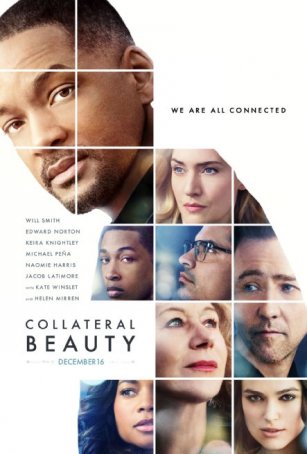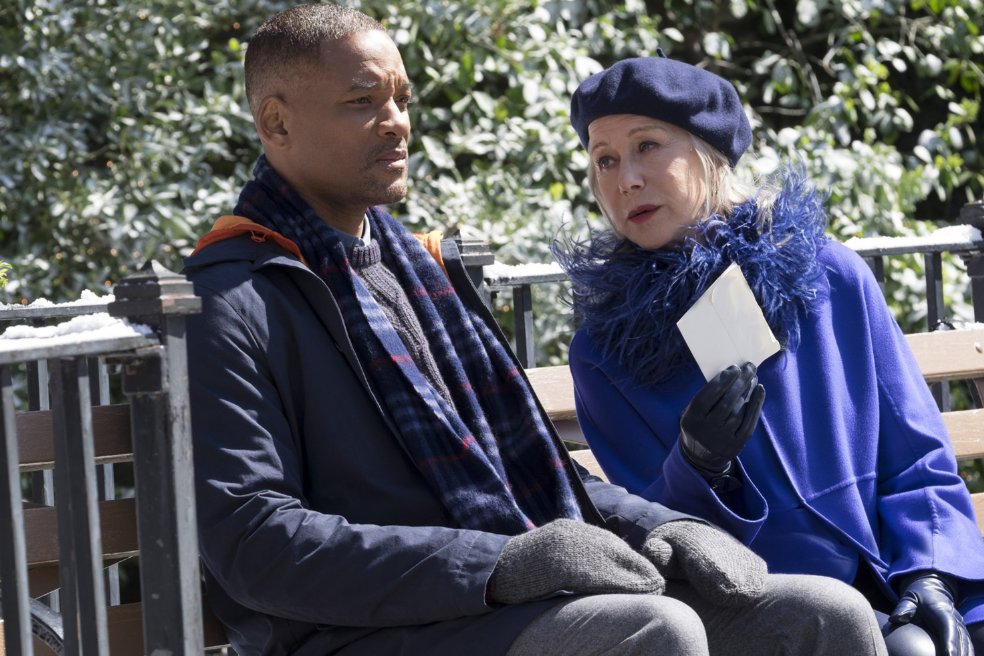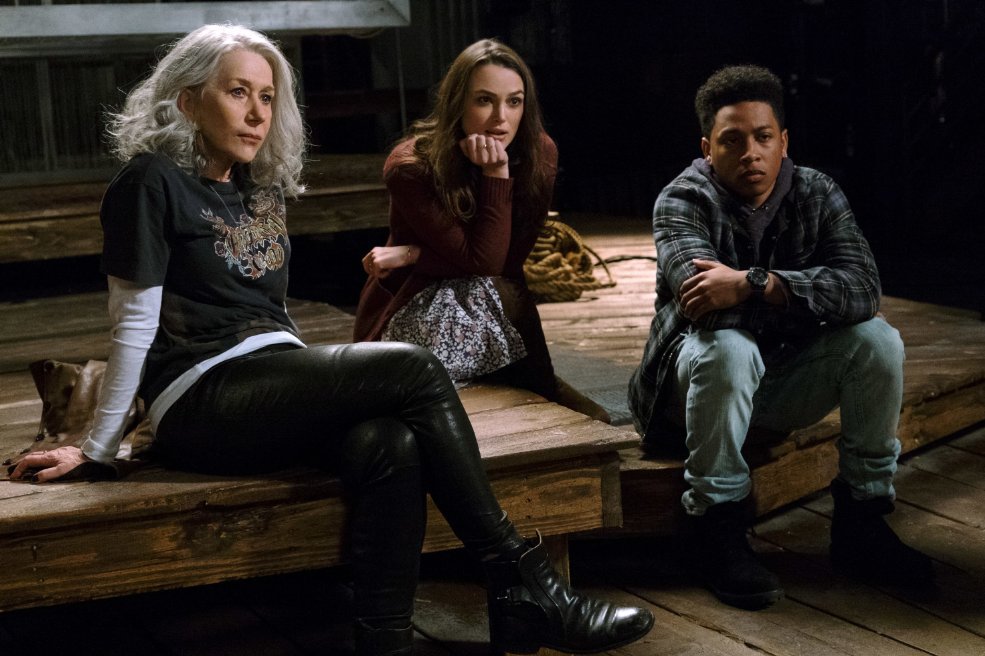Collateral Beauty (United States, 2016)
December 17, 2016
It’s easy to understand why Collateral Beauty, at one time viewed as a potential Oscar contender, was removed from awards consideration by Warner Brothers. (They decided to dump it into theaters on the same day as Rogue One, possibly hoping no one would notice that it had been released.) Pretentious and manipulative, the movie bludgeons viewers with its new age philosophizing and its desire to be considered meaningful. Director David Frankel’s ham-fisted approach is more likely to make viewers cringe than cry and, when tears occur, those who shed them may be embarrassed for doing so. Nothing in this contrived melodrama feels real - the characters don’t act like genuine people and the narrative arc is so hard-to-swallow that even accepting a little magical realism doesn’t patch the holes. Despite a top-notch cast, Collateral Beauty is unable to take flight.
When we first meet Howard (Will Smith), he’s a high-energy performer, full of life and good humor. Three years later, he’s a shell of his former self, coming to work and, instead of running the company, setting up elaborate domino toppling schemes. He rarely speaks and refuses to sign the papers that would allow his fellow owners, Whit (Edward Norton), Claire (Kate Winslet), and Simon (Michael Pena), to sell. The reason for Howard’s malaise is that he lost his six-year old daughter to cancer two years ago and has been unable to pull himself together. He spends his spare time sitting in a dog park staring into space and writing bitter letters to Death, Love, and Time. Desperate to try something - anything - to bring him back to reality, Whit suggests hiring actors to play Death, Love, and Time and, like the three ghosts in “A Christmas Carol”, they can visit Howard. Enter Brigitte (Helen Mirren), who is cast as Death; Amy (Keira Knightley), whose sweetness is perfect for Love; and Raffi (Jacob Latimore), who brings an edge to Time. After his initial encounters with these three inhuman embodiments, Howard begins to question his sanity and takes the monumental step of attending a support group for the parents of dead children. There he meets Madeleine (Naomie Harris) and they begin to form a fragile bond.
 Problems begin with the story. Movies about dead children can be difficult to sit through, even when there’s the promise of a catharsis at the end, and Collateral Beauty ups the ante by having Howard’s partners institute torture by making him believe he’s seeing things. They go so far as to video record his encounters with Death, Time, and Love and digitally erase Brigitte, Amy, and Raffi from the images. The film seems to want us to care about Whit, Claire, and Simon but their actions are reprehensible; to ignore the consequences is an unforgivable oversight on the part of director Frankel and screenwriter Allan Loeb. They’re too busy trying to make us weep by showing us shots of the happy little girl who has since died.
Problems begin with the story. Movies about dead children can be difficult to sit through, even when there’s the promise of a catharsis at the end, and Collateral Beauty ups the ante by having Howard’s partners institute torture by making him believe he’s seeing things. They go so far as to video record his encounters with Death, Time, and Love and digitally erase Brigitte, Amy, and Raffi from the images. The film seems to want us to care about Whit, Claire, and Simon but their actions are reprehensible; to ignore the consequences is an unforgivable oversight on the part of director Frankel and screenwriter Allan Loeb. They’re too busy trying to make us weep by showing us shots of the happy little girl who has since died.
Not content to merely tell the story about how the Three Ghosts help restore Howard, Collateral Beauty sets up parallels with the grief-stricken man’s partners. Whit has problems with affection (especially where his daughter is concerned), so he’s paired with Amy/Love. Simon is suffering from a terminal illness that he has hidden from his family; he gives Brigitte/Death her briefings. And workaholic Claire has gotten too old to have a child; her charge is Raffi/Time. Instead of giving Collateral Beauty more depth and meaning, these secondary storylines enhance how false and forced everything is.
 The high level of the talent involved indicates there must have been something attractive about this movie. Indeed, there are hints of a better project about how parents cope with death. It’s a raw, difficult subject and Collateral Beauty drops the ball. This production is proof that no matter how many cast members can claim Oscar nominations, quality isn’t assured. Tallying up the totals: the actors appearing here have eighteen of them, including two wins.
The high level of the talent involved indicates there must have been something attractive about this movie. Indeed, there are hints of a better project about how parents cope with death. It’s a raw, difficult subject and Collateral Beauty drops the ball. This production is proof that no matter how many cast members can claim Oscar nominations, quality isn’t assured. Tallying up the totals: the actors appearing here have eighteen of them, including two wins.
Smith’s performance is hamstrung by a screenplay that, in a desperate attempt to echo “A Christmas Carol”, never finds its footing. The actor always seems at his best when he’s playing a high-energy character and the film gives us just enough of that to regret all the subsequent dour, saccharine material. Howard is a writer’s construct, wandering around reacting however he’s needed to react to advance the story. There’s also a twist that, when considering retrospectively, is an obvious case of the movie not playing fair with its audience. If you think back on the interaction between the involved characters, it doesn’t work in light of their true relationship. Like everything else in Collateral Beauty, it’s artificial.
If there’s one constant about Collateral Beauty, it’s how consistently it disappoints. One can argue that the seeds of a powerful movie might be buried deep in the soil of Allan Loeb’s screenplay but they are never given an opportunity to germinate. Unable to generate an honest emotional response, the filmmakers resort to cheap trickery and heart-string rending music. With Collateral Beauty, it’s impossible to hide the ugliness.
Collateral Beauty (United States, 2016)
Cast: Will Smith, Edward Norton, Kate Winslet, Michael Pena, Helen Mirren, Naomie Harris, Keira Knightley, Jacob Latimore
Screenplay: Allan Loeb
Cinematography: Maryse Alberti
Music: Theodore Shapiro
U.S. Distributor: Warner Brothers
U.S. Release Date: 2016-12-16
MPAA Rating: "PG-13" (Profanity, Adult Themes)
Genre: Drama
Subtitles: none
Theatrical Aspect Ratio: 2.35:1
Comments